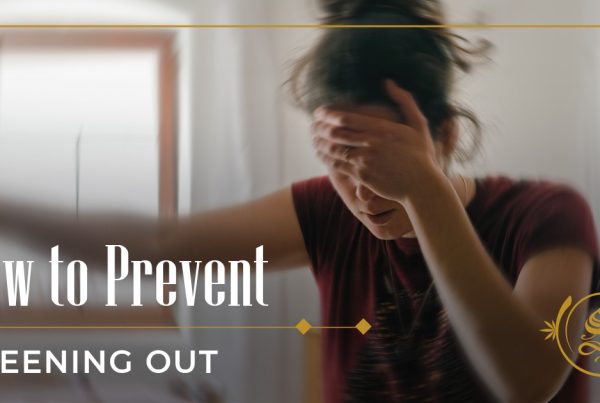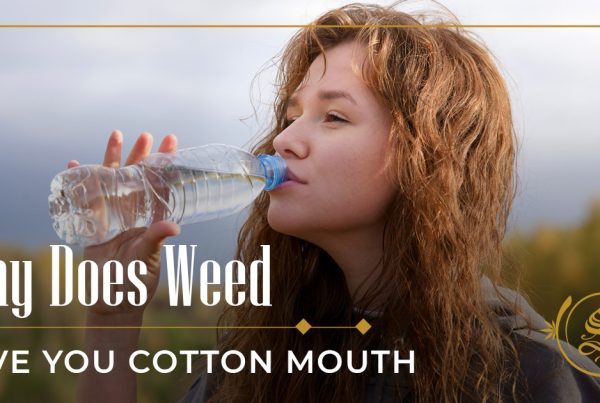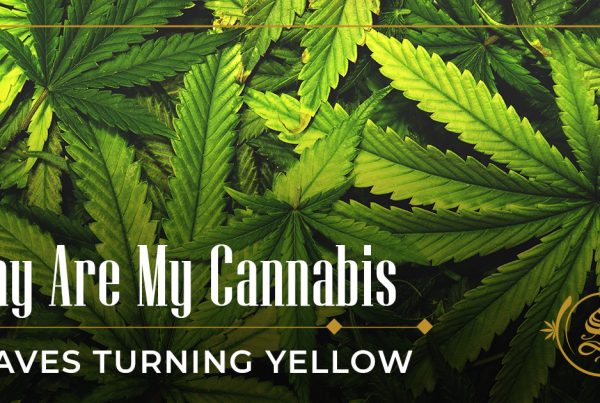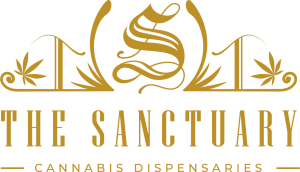The occasional cough, red eyes and dry mouth feel tend to be the most common (but minor) drawbacks to smoking weed. Since they are all easily preventable, they do not cause much concern, especially for new smokers. However, the ‘burnt tongue’, albeit a bit more rare, is one that lives in infamy to old and new smokers alike.
It might not be exactly what you are picturing by the name but it is nonetheless an uncomfortable feeling that can be fixed at home (before it gets too severe). You are more likely to get tongue burn from something like coffee or hot chocolate or just hot foods, but it can absolutely happen if you’re not too careful when you smoke.
Luckily for you (and your tongue) preventing it is super easy and in most cases, needs nothing more than a couple of things from your medicine cabinet. Instead of going to the doctor every time you want to enjoy your weed or dabs, just follow one of these life hacks and you’ll be able to keep your tongue unburned.
What is Tongue Burn?
Again, despite the name, tongue burn can refer to anywhere inside of your mouth (hence its more universal name Burning Mouth Syndrome), but it just more commonly affects your tongue since it is generally more sensitive. Don’t believe it? Think about the last time you accidentally bit on your tongue and how much more it hurt compared to biting the sides of your mouth or lips.
The tongue is essentially the door man to your esophagus and its sensitivity prevents you from swallowing extremely hot things that could be dangerous. So when your tongue gets too hot, it can lead to dry-mouth-like symptoms that cause you to drink more fluids, or a loss of taste outside of the obvious burning sensation.
Tongue Burn vs. Tongue Bite
They may be in the same area and compare to each other in terms of the level of discomfort, but tongue bite is still noticeably different than tongue burn. Since your tongue is so sensitive, especially your taste buds, the effects of hot smoke or drinks feel like they last longer than if you simply bit down on your tongue. Both hurt like hell, but the former tends to be longer.
The difference may be anecdotal but deeply inhaling your smoke while eating a particularly spicy snack will make your tongue burn and feel numb for what feels like hours if you do nothing to it, but if you bite your tongue and do nothing, the pain might go away in under 5 minutes. Both hurt, but you can cure the former in that same span of time if you follow the steps below.
How to Cure Tongue Burn
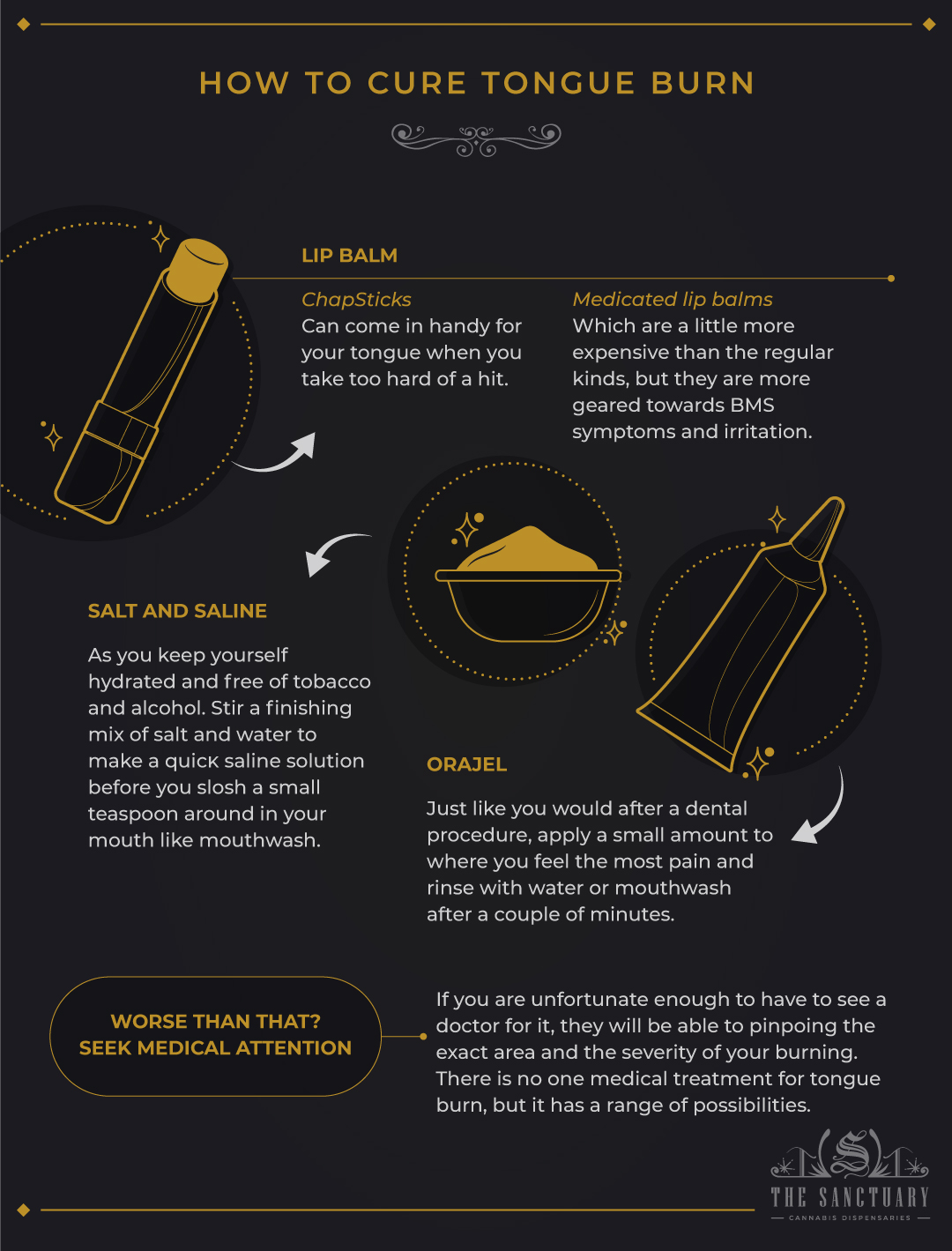 With the help of your everyday mouth and lip care products, tongue burn can be alleviated in less than the time it takes you to roll a blunt. Not every single case is the same but if you manage to cure the burn before any damage could take place, you will not have any problems curing your tongue burn at home.
With the help of your everyday mouth and lip care products, tongue burn can be alleviated in less than the time it takes you to roll a blunt. Not every single case is the same but if you manage to cure the burn before any damage could take place, you will not have any problems curing your tongue burn at home.
Lip Balm
It might not have the soothing satisfaction of a cold compress, but it is one of the best and easiest ways to take something you might already be doing right now and turn it into something more beneficial for your body.
Those ChapSticks you keep losing can come in handy for your tongue when you take too hard of a hit. There are also medicated lip balms which are a little more expensive than the regular kinds, but they are more geared towards BMS symptoms and irritation.
Salt and Saline
Stepping into the ‘homemade remedy’ side of things, we look to more common household items like salt and a saline solution to get the job done. As you keep yourself hydrated and free of tobacco and alcohol though a nice beer while watching the game will do no long-term damage, stir a finishing mix of salt and water to make a quick saline solution before you slosh a small teaspoon around in your mouth like mouthwash.
Orajel
Lastly, Orajel is not just for numbing the post-wisdom-tooth-removal pain. But just like you would after a dental procedure, apply a small amount to where you feel the most pain and rinse with water or mouthwash after a couple of minutes.
Worse than that? Seek Medical Attention
Unless you licked something like your stove top or used your tongue as an ashtray, you probably (and thankfully) will not need any major surgery to correct your burnt tongue.
But if you are unfortunate enough to have to see a doctor for it, they will likely do a full examination of your medical history and your daily habits to pinpoint the exact area and the severity of your burning. There is no one medical treatment for tongue burn (or inflamed epiglottis), as we have already seen, but it has a range of possibilities ranging from home remedies to prescribing pain meds or antidepressants.
Cannabis for BMS
In case you were wondering: Yes, BMS is short for Burning Mouth Syndrome. ‘But how does cannabis help with that? Isn’t that what caused my tongue to burn in the first place?’ Depending on what you inhaled or how much, cannabis might not have been the cause of your tongue burn but it can be part of the solution.
It will not be in the form of smoking, but cannabis, specifically sativa oil will be a great help in reducing BMS related pains and symptoms. The regimen on average requires a small dose of oil daily for 30-40 days, but the results will speak for themselves.
Does it work better than OTC medicines?
In terms of side effects, cannabis treatments are typically the better choice. Yes, cannabis side effects could still occur but they are not as severe or often as your typical over-the-counter medications.
Severe use, left unchecked, will do much more damage than a hot or slightly burned tongue and (potentially) affect your liver, kidneys, internal bleed, etc. at the same time, cannabis side effects include that dry-mouth feeling that comes with burnt tongue or a loss of appetite or brief loss of short-term memory. Fast-acting medications may compare to how fast cannabis works but they come up short when comparing side effects.



